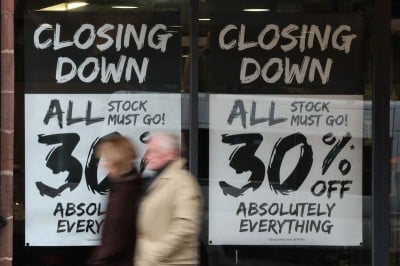
Thomas Barwick / Getty Images
Add this to the long list of ways to tell if the economy is headed for a recession: Companies file more misleading reports in the time leading up to a major downturn, a new study has found.
According to a new peer-reviewed paper by researchers at the University of Missouri and Indiana University, the more companies lie on their financial statements, the higher the chance the economy is headed for a recession in the next five to eight quarters.
The new measure could help economists more accurately predict whether a major economic setback is ahead. While many experts currently foresee the economy entering a mild recession next year as a result of the Federal Reserve’s anti-inflation interest rate hikes, forecasts vary widely about whether we’ll get one and how bad it will be.
This new model shows that while misleading statements are on the rise, a recession is unlikely, and instead we’re in for a period of slowed economic growth that’s not bad enough to be called a recession, the researchers said in an email.
“When companies misreport information, it can take years before they are caught, if they’re caught at all — and many are not,” said Matthew Glendening, a professor of accounting at the University of Missouri and one of the authors of the study, in a press release. “Our model shows that the likelihood of financial statement manipulation helps predict the outlook of the economy.”
Note
With expert opinion heavily divided about the possibility of a recession ahead, oddball indicators offer alternative ways to tell if a major economic downturn is brewing. Some examples include men’s underwear sales, library circulation, and whether the Phillies win the World Series.
The study relies on a metric called an M-score, which is an analysis tool used to determine the likelihood that a financial statement has been manipulated. The M-score model includes information on sales, expenses, and corporate debt, the ratios between them, and assigns a score indicating the chances that the books have been cooked. The researchers analyzed a database of corporate reports for thousands of publicly traded companies going back 43 years.
It turned out that the higher the combined M-scores of publicly traded companies were, the greater the likelihood of a recession occurring in the next five to eight quarters was. Smaller jumps in misleading statements preceded minor economic slowdowns. The researchers pointed out that corporate data manipulation was not merely a predictor of recessions, but actually damaged the economy.
“Accounting matters, and manipulated accounting information can negatively impact the economy,” Glendening said in a press release. “When financial reporting is not adequately monitored and companies manipulate financial information, it can have potentially damaging consequences. Not only do investors use this information, but other firms do so as well. In many cases, firms make employment and investment decisions based on this information, which can be way too optimistic.”
Have a question, comment, or story to share? You can reach Diccon at [email protected].






